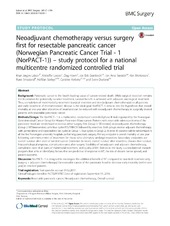Neoadjuvant chemotherapy versus surgery first for resectable pancreatic cancer (Norwegian Pancreatic Cancer Trial - 1 (NorPACT-1)) – study protocol for a national multicentre randomized controlled trial
Labori, Knut Jørgen; Lassen, Kristoffer; Hoem, Dag; Grønbech, Jon Erik; Søreide, Jon Arne; Mortensen, Kim Erlend; Smaaland, Rune; Sorbye, Halfdan; Verbeke, Caroline Sophie; Dueland, Svein
Peer reviewed, Journal article
Published version

Åpne
Permanent lenke
https://hdl.handle.net/1956/18217Utgivelsesdato
2017-08-25Metadata
Vis full innførselSamlinger
Originalversjon
https://doi.org/10.1186/s12893-017-0291-1Sammendrag
Background: Pancreatic cancer is the fourth leading cause of cancer-related death. While surgical resection remains the foundation for potentially curative treatment, survival benefit is achieved with adjuvant oncological treatment. Thus, completion of multimodality treatment (surgical resection and (neo)adjuvant chemotherapy) to all patients and early treatment of micrometastatic disease is the ideal goal. NorPACT–1 aims to test the hypothesis that overall mortality at one year after allocation of treatment can be reduced with neoadjuvant chemotherapy in surgically treated patients with resectable pancreatic cancer. Methods/Design: The NorPACT– 1 is a multicentre, randomized controlled phase III trial organized by the Norwegian Gastrointestinal Cancer Group for Hepato-Pancreato-Biliary cancer. Patients with resectable adenocarcinoma of the pancreatic head are randomized to receive either surgery first (Group 1: SF/control) or neoadjuvant chemotherapy (Group 2: NT/intervention) with four cycles FOLFIRINOX followed by resection. Both groups receive adjuvant chemotherapy with gemicitabine and capecitabine (six cycles in Group 1, four cycles in Group 2). In total 90 patients will be randomized in all the five Norwegian university hospitals performing pancreatic surgery. Primary endpoint is overall mortality at one year following commencement of treatment for those who ultimately undergo resection. Secondary endpoints are overall survival after date of randomization (intention to treat), overall survival after resection, disease-free survival, histopathological response, complication rates after surgery, feasibility of neoadjuvant and adjuvant chemotherapy, completion rates of all parts of multimodal treatment, and quality-of-life. Bolt-on to the study is a translational research program that aims at identifying factors that are predictive of response to NT, the risk of distant cancer spread, and patient outcome. Discussion: NorPACT– 1 is designed to investigate the additional benefit of NT compared to standard treatment only (surgery + adjuvant chemotherapy) for resectable cancer of the pancreatic head to decrease early mortality (within one year) in resected patients.
